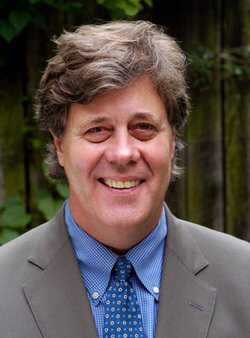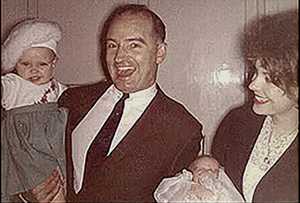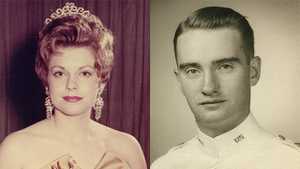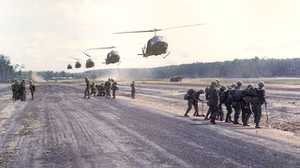Author Interview: David Maraniss
From the Collections: Vietnam War | The Library
David Maraniss is the author of the critically-acclaimed They Marched into Sunlight: War and Peace, Vietnam and America, October 1967 (Simon & Schuster, 2003), on which the American Experience film Two Days in October is based. Maraniss also served as a Pulitzer Prize-winning associate editor at The Washington Post and has written biographies of Vince Lombardi and Bill Clinton.
Here, he discusses the book.
Can you explain your book's unusual structure?
The structure came to me in my sleep. I had been thinking about writing a book about Vietnam and the Sixties for several years. In my previous books, from the Clinton biography to the Lombardi biography, I found myself more deeply obsessed when the chronology came around to the Sixties and thought that someday I would write a book just about that period. I knew that the literature about the war itself was deep and rich, that there was not so much about the antiwar, and that I had not seen a book that had tried to bring these very different worlds together in a single interwoven narrative -- very different worlds that were nonetheless about the same thing. My idea began with the Dow demonstration, the first antiwar action I had witnessed. I simply asked myself the question: What was going on in Vietnam those two days? I went to the microfilm at The Washington Post, where I work, and found a story about the battle -- and slowly it all started to come together from there.
Would anyone equate the soldiers' experiences with those of the students?
The question of equating the student soldier experiences is the most complicated one that I have to deal with. On one level, they are absolutely not equal. The soldiers faced a life and death situation and saw the worst that humans can do to humans. They were in a situation that they could not step away from. The students could just go home the next day if they wanted to. A police baton, no matter how brutal, can not be equated with a claymore mine.
But my philosophy is that all human beings face situations and challenges based on life as it comes to them, and how they respond to those situations is equally interesting and compelling. Another strong subtheme of the book is the betrayal of the young by the old and the rank and file by leadership, in both situations.
Did you witness the University of Wisconsin protests?
In October 1967 when the Black Lions were fighting and dying in the jungle of the Long Nguyen Secret Zone and antiwar protesters were staging a sit-in at the Commerce building, I was a naïve freshman at the University of Wisconsin. I observed the demonstration from the edge of the crowd, and felt the sting of tear gas, and saw a few things that I mostly forgot.
Was a trip to Vietnam necessary in order to write the book?
One of my mottos of writing is: Go there. Wherever there is. For the Lombardi book it meant moving to Green Bay for the winter. For the Vietnam book it meant going to Vietnam. Even though everything was different and the battlefield looked nothing like it did in 1967, everything, in a sense was still the same. Even though the trip is only reflected overtly in the epilogue, I could not have written any of it without going there.
How did you get such amazing interviews?
My approach to interviews is essentially the golden rule, interview people the way you would want to be interviewed. That means first, studying the subjects, knowing as much as possible about them and their history and their approach to life. Two, letting them talk first, to tell you what they want to say so they don't feel boxed in. Third, not rushing it, letting them know you are in it for the long haul and you want to get it right. Fourth, not pretending to be anything that you aren't, trying to sucker them into something that everyone will regret later. That means no promises. Before my first interview with Clark Welch, he kept insisting that he would only talk if I promised to be good to "his boys." I said that I could not make that promise, that I could only assure him that I would be thorough and try to find the truth and be honest with him about it all along the way. He eventually decided to trust me, and it made the relationship stronger all along the way than if I had made him a phony promise. Fifth, following on that, absolutely no surprises, let them know what you know and what you are finding out all along the way.
Do you consider yourself a journalist, or a historian?
I approach history as a historian, declining to make a distinction between a journalist and a historian in this case. I do not go in with an agenda except to try to find the truth or the closest I can get to it using rational thinking and deep research. I don't start with an ideological preconception, but only an obsession to find out what really happened and why.
How does your own life experience relate to the book?
My experiences and character inevitably shaped this book. My experiences because I am from the baby boom generation and everything I do and think is somehow shaped by the Sixties and Vietnam. My character because it is my nature to be interested in all sorts of people of vastly different mindsets and political perspectives and to look for the humanity in all of them.
Were you drafted into the Vietnam War?
I received a low number in the draft lottery in 1970 and rode the bus to Milwaukee for an induction physical but was declared 4-F because of chronic asthma that I'd had since childhood.
Interview originally published in 2005.







